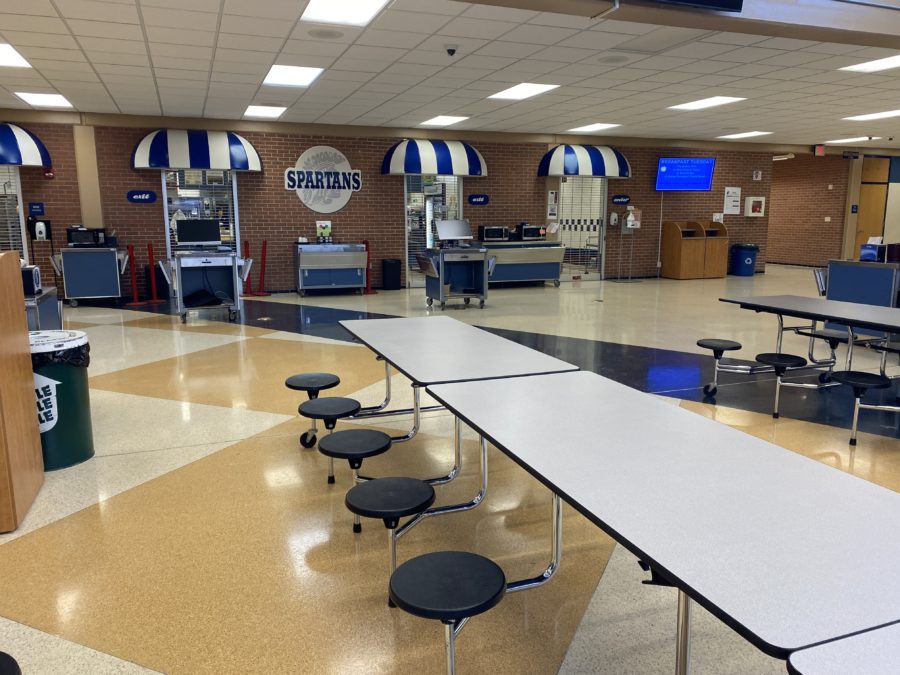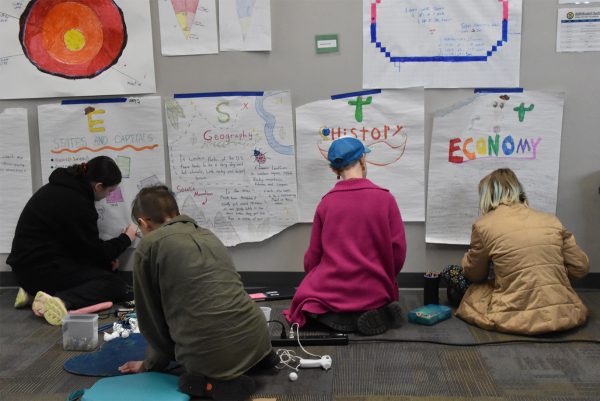School lunch is a human right, not a privilege
North High cafeteria
It’s been a common trend throughout the school systems in the United States to require children to pay for their meals while at school. While seemingly the norm, when actually considering the morals of this decision, it is easy to see how messed up the concept actually is.
First off, every child is required to attend school in the United States. If they don’t, it’s considered educational neglect and child services can come visit families. Because of this, most guardians send their children through the most convenient educational path: public school. While there are the exceptions of private, online, and homeschooling, the majority of students spend nine months of their year in publicly-funded classrooms, since most parents don’t have the means to try alternative ways to educate their children.
With this in mind, it would only make sense for these public schools to provide school lunch for their students. If they’re legally required to be there anyway, why make them pay for their right to eat school lunch? Sadly, that isn’t the case. During the COVID pandemic, the federal government helped pay for meals, so students did not pay for them. Now, many states are returning to charging their students for their food again.
Public school food may not be the highest quality, but it can be very beneficial to the children that eat it physically and mentally. Food is the fuel to our brains, and for being in an environment that focuses on the use of our brains, the ability to eat lunch is almost a necessity if students want to do their best in school.
Deprivation of this can slow down your body, making it have to reserve as much energy as possible before the next meal. This energy saving can affect children’s behavior, often causing moodiness, lack of concentration and more difficult memory retention usage. It also makes them more tired and sluggish, a problematic trend that’s already established throughout schools when regarding the sleep students are getting.
Despite having to pay for school lunch, the food itself isn’t the best quality either. We’ve all heard the jokes and memes about how unappetizing school lunches are (mostly coming from American students), but the reasons behind why school lunches are infamous for being gross are because of the process of getting lunch to students’ trays.
Due to convenience and sustainability, almost all the food found in the cafeteria can also be found in cans and boxes at the grocery store. This process doesn’t allow for students to find fresh food at school easily, lowering the quality of their diet. Adding onto this, most school meals are highly processed, and this can be unhealthy for students as well.
It’s not even specifically just school lunch that’s the problem, it’s also the breakfasts schools typically offer. Again with the multiple health benefits, it’s heavily encouraged for students to eat breakfast. Yet schools are preventing some students from getting the proclaimed “most important meal of the day” by charging them anytime they want a muffin or orange juice to fuel them for their next few classes. It’s unfair for schools to expect students to be at their best during class without providing them with food charge-free.
Families are starting to feel the pressure when it comes to the costs of feeding their children at school. For families of four, their household income has to be $55,500 or lower in order to qualify for free or reduced school lunch. This isn’t to say that families that make above this aren’t struggling, though. There’s the problem with the families that make just a little bit above this range, being in the same position as the families that qualify but aren’t getting the same benefits.
Also, with inflation rising, it’s affecting the amount families have to pay to keep their children’s stomachs full. It’s just unnecessary stress, possibly causing guilt for students of lower-income families and making them feel like a burden for causing their family to set aside their already limited money for lunches.
Sure, there could be the case that schools in the states don’t have the means to provide everyone with free meals – but they do. As mentioned earlier, during the pandemic, states were able to require free school meals with the help of the federal government providing them the funds. However, as the concern for COVID-19 wanes, the protocols that were implemented are also starting to slow too, including free lunches for everyone regardless of income.
While states can decide if they want to continue this, North Dakota is one of the states that are deciding to go back to charging students for their school lunches, angering a lot of residents. Adding onto this frustration, North Dakota recently also had the opportunity to expand who would receive free or reduced school lunches within the state with $6 million from the state budget, and the Senate decided against it. Larry Luick said of this decision, “As of the time we voted on this bill, we were $1.7 billion in the hole for trying to dole out funds to all the bills that were asking for money for whatever purpose.”
It’s interesting that not even a week after the decision, the Senate voted to increase their own meal funding when traveling around within the state. The Senate minority leader Kathy Hogan highlights the problematic nature of this, “How can we vote for ourselves when we can’t vote for children?”
It’s also interesting how North Dakota is deciding to spend their funds on things such as banning books in libraries rather than feeding the younger generation, spotlighting the skewed priorities these politicians seem to have.
All in all, the government can’t expect children to grow up efficiently taking on the tasks of the real world if they’re not doing their part to feed them in the first place. The system of forcing children and their families to pay for their food in a place they’re already required to be in is simply unfair and illogical. North Dakota, and every other state who’s choosing against funding their students’ meals, need to do better for the sake of the younger generations.
Your donation will support the student journalists of Fargo North High School. Your contribution will allow us to resume physical printing of our newspaper for students at Fargo North!










